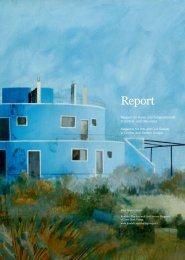Report_Issue 1/2009 - Jubiläum/ 20 Jahre Mauerfall
Report_Issue 1/2009 - Jubiläum/ 20 Jahre Mauerfall
Report_Issue 1/2009 - Jubiläum/ 20 Jahre Mauerfall
Sie wollen auch ein ePaper? Erhöhen Sie die Reichweite Ihrer Titel.
YUMPU macht aus Druck-PDFs automatisch weboptimierte ePaper, die Google liebt.
“These ridiculous visas belong back<br />
in the depths of the 19th century!”<br />
The historian and journalist Karl Schlögel is a traveller, observer and storyteller who perceives processes<br />
of change and reinterprets them unusually in a manner that is more essayistic than academic.<br />
— Bert Rebhandl talks to Karl Schlögel —<br />
Bert Rebhandl: Mr. Schlögel, where exactly is<br />
Marijampole, the city mentioned in the title of<br />
your new book?<br />
Karl Schlögel: Marijampole is not all that wellknown<br />
a place. Even when you mention it to<br />
Lithuanians, they look at you sceptically. The<br />
name probably makes them think of dubious<br />
dealings. I had my attention drawn to it because<br />
in the nineties there were always these<br />
convoys of Lithuanian cars on the Berlin Ring<br />
Road, both private cars and car transporters.<br />
I investigated where these treks led to, and<br />
found out that at the place where Poland, Byelorussia<br />
and Lithuania meet, there is this town<br />
Marijampole, which is known for its huge car<br />
bazaar. Later, I even once saw it from a plane –<br />
one enormous car park. Marijampole seems to<br />
me to be one of the relays that make up Europe:<br />
it is a bazaar, but one that specialises in cars.<br />
For me it represents a place for catching up on<br />
automobilisation, and thus a significant transformation<br />
factor. You can see here that people<br />
did not wait for the state to come up with some<br />
programme or other for them when they lost<br />
their jobs. Hundreds, thousands of people<br />
went into this business, which extends to the<br />
west between the Ruhr area and Belgium and<br />
Lithuania. These are people who became unemployed<br />
overnight, who have somehow got<br />
over it and now study the used-car adverts in<br />
regional German newspapers. They have taken<br />
responsibility for themselves. There is a third<br />
aspect that interests me: Marijampole is only<br />
a mediatory point. The cars go on to Dushanbe<br />
or Tashkent, sometimes in bulk. Much more<br />
happens than just the sale of a car. I always<br />
have to think of the word “caravanserai”, and<br />
the cosmopolitanism it implies. To me, these<br />
people are really heroes, because they carry on<br />
the everyday business of normalisation.<br />
You call these people the “contrabandists of<br />
compensation” – a nice description. But it also<br />
involves a problem. European institutions and<br />
politicians want a transformation from the top,<br />
regulated change and compensation. But what<br />
you describe is a huge informal sector.<br />
I have undertaken various attempts to bring<br />
these two spheres into contact with one another.<br />
It would be much better if there were<br />
fewer conferences on cultural self-images and<br />
more contact between these spheres. Here,<br />
the industrious and eager EU bureaucrats<br />
moving in their corridors; there, the streams<br />
of lorries, the customs checkpoints, the railway<br />
stations, the cheap airlines, the queues in<br />
front of embassies, and naturally the trade in<br />
women as well. These are streams that barely<br />
intersect with those of bureaucracy. Mal-<br />
gorzata Irek, who did a long-term study on<br />
smuggling between Berlin and Warsaw, found<br />
out that something has changed. That the famous<br />
“Polish cleaning lady” in Berlin stands<br />
for a whole generation of extremely successful<br />
businesswomen. It is in these crawling<br />
streams that things happen. If Europe is to<br />
become something, it has to adapt to this antlike<br />
activity. The heroic phase of individuals<br />
coping with crises is over; a certain stabilisation<br />
has taken place.<br />
Does that mean there is too little knowledge<br />
about everyday life in Europe?<br />
No, the knowledge is there. For example, if you<br />
meet someone who tells you that he went to<br />
the Ukraine from Bavaria to modernise an old<br />
brewery in Odessa that was already Bavarian<br />
before the war, then this person basically lives<br />
out the whole history of New Europe. These<br />
people who work on the spot, sometimes as if<br />
they had been dropped in by parachute, who<br />
are not experts on eastern Europe or on transformation:<br />
they rely for their existence on taking<br />
things extremely seriously. Opening a bank,<br />
a branch of a supermarket – that requires unbelievably<br />
concrete expert knowledge that you<br />
cannot obtain at any institute these days.<br />
Within Eastern Europe there is a north-south<br />
divide. The Baltic region seems to be adapting<br />
faster than Bulgaria or Romania, for example.<br />
Turkey is an interface – in a religious and cultural<br />
regard as well. How do you see Turkey’s<br />
future in Europe?<br />
I am not in favour of Turkey’s becoming a full<br />
member of the EU. I am in favour of taking the<br />
European inheritance of the Ottoman Empire<br />
seriously and offensively pulling Turkey towards<br />
Europe. But I am against any comprehensive,<br />
schematic integration. The EU will<br />
not be able to take that in the long term. We<br />
must develop ways of activating the European<br />
element in Turkey that are more intelligent and<br />
precise. I use the image of dovetailing. Hinges<br />
need to be created, irreversible points of cooperation.<br />
This is of course difficult as long as<br />
anything but full membership seems inferior.<br />
Against the background of the Russian experience,<br />
the modernisation of Turkey is one of<br />
the big success stories of the <strong>20</strong>th century. If<br />
we compare the dissolution of the Russian empire<br />
with that of the Ottoman Empire, there<br />
are many amazing parallels, including the<br />
large-scale crime that took place at the start of<br />
modern Turkey and the huge development of<br />
violence in the Soviet Union. In the long term,<br />
the modernisation of Turkey has actually been<br />
more lasting.<br />
Full accession to the EU is now a question of<br />
national pride in Turkey as well.<br />
It has been turned into that, and that’s a bad<br />
thing. I am a fan of Turkey, I’m very impressed<br />
by the combination of tradition and modernity,<br />
by the traditional working culture and<br />
the things that have come into the country by<br />
virtue of its belonging to NATO, to the “West”.<br />
I am full of admiration for the way modern<br />
Turkish cities “tick” – especially against the<br />
background of my experiences in Russia, where<br />
things are extremely slow and difficult.<br />
So where does “your” Europe end?<br />
Europe is primarily a place, a small peninsula<br />
in the Eurasian land mass, as Paul Valéry said.<br />
Normally, people say: Europe is not only a<br />
place, but a system of values. I define Europe<br />
as a place. Here, there were Adolf Hitler and<br />
Walter Benjamin, Lenin and Chagall, glory<br />
and disaster. We cannot just choose the good<br />
things. This place, with all its uncertainties,<br />
is simply the continent, up to the Urals, up to<br />
Asia Minor. The whole Aegean was a European<br />
sea. I am naturally of the opinion that Russia is<br />
a part of European culture, but I would never<br />
say that Russia should be taken into the Union,<br />
because it is really a continent in its own right<br />
that extends to the Pacific. I am in favour of<br />
increasing the permeability of borders and<br />
mobility. These days there are already corridors<br />
between the cities, for example, between<br />
Moscow, Minsk and Warsaw. What is happening<br />
in the Ukraine, for example, is sensational.<br />
There, there is a one-sided opening; it is like<br />
the Wall coming down a second time. You can<br />
go to Kiev without a visa and look at the first<br />
mother of eastern European cities. Neighbourhood<br />
that becomes routine is the foundation of<br />
Europe. These visas belong back in the depths<br />
of the 19th century! We must find other forms<br />
of security. The people who would benefit most<br />
from a modern visa practice would not be the<br />
criminals, but ordinary people.<br />
You are neither a sociologist in the classical<br />
sense, nor a statistician. How would you term<br />
the method of observation that you employ?<br />
I have a different matrix. I have to visit certain<br />
cities regularly (you even have to go to Moscow<br />
every three months), regularly travel certain<br />
routes, and keep a sort of long-term diary.<br />
These are my attempts to measure the process<br />
of transformation. There are cities that are “out<br />
of the woods”. You can say that about Krakow,<br />
Poznań, Wrocław. There, a certain permanence<br />
has prevailed against the “bombshell”<br />
effects. There have been not only cosmetic corrections,<br />
but a regeneration. I look for signs of<br />
a renewal, the opposite indications to those of<br />
collapse and bitterness. You can see the forced<br />
industrialisation with your bare eyes. What is<br />
much more interesting is the almost invisible<br />
first signs: Is something in the air? Will it be<br />
strong enough to prevail? That is my matrix of<br />
observation.<br />
You are now teaching at the European University<br />
Viadrina. Does this institution already do<br />
justice to this title?<br />
I have to say yes and no. Almost forty percent<br />
of the students come from eastern Europe,<br />
mostly Poland. The situation is therefore<br />
more a bi-national one, not a plural one.<br />
This does not yet mean that everyone has<br />
adapted to this Europeanness. There are also<br />
very strong conventional elements. The opportunities<br />
of operating in a new territory are<br />
not being used enough yet. The generation of<br />
students being educated now has grown up<br />
without any historical memory of Solidarność<br />
and East Germany, and moves on both sides<br />
of the border as if it were the most natural<br />
thing in the world. This generation will have<br />
the task of shaping a real European university.<br />
Karl Schlögel, born in 1948, was a professor of Eastern<br />
European history at Constance University before<br />
taking up a position at the European University Viadrina<br />
in 1994. In <strong>20</strong>02 he published the book “Die Mitte<br />
liegt ostwärts. Europa in Übergang”. His most recent<br />
publication is “Marjampole oder Europas Wiederkehr<br />
aus dem Geist der Städte” (both published by Hanser<br />
Verlag).<br />
In <strong>20</strong>08 Karl Schlögel was awarded the “Leipziger<br />
Buchpreis zur Europäischen Verständigung”<br />
Bert Rebhandl lives in Berlin as a freelance journalist<br />
and author.<br />
Published in “<strong>Report</strong>” 2/<strong>20</strong>05<br />
11




